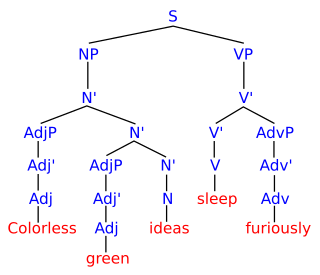Related Research Articles

Cyc is a long-term artificial intelligence project that aims to assemble a comprehensive ontology and knowledge base that spans the basic concepts and rules about how the world works. Hoping to capture common sense knowledge, Cyc focuses on implicit knowledge that other AI platforms may take for granted. This is contrasted with facts one might find somewhere on the internet or retrieve via a search engine or Wikipedia. Cyc enables semantic reasoners to perform human-like reasoning and be less "brittle" when confronted with novel situations.

In logic, mathematics, computer science, and linguistics, a formal language consists of words whose letters are taken from an alphabet and are well-formed according to a specific set of rules.
The following outline is provided as an overview and topical guide to linguistics:

A programming language is any set of rules that converts strings, or graphical program elements in the case of visual programming languages, to various kinds of machine code output. Programming languages are one kind of computer language, and are used in computer programming to implement algorithms.
In computer science and information science, an ontology encompasses a representation, formal naming, and definition of the categories, properties, and relations between the concepts, data, and entities that substantiate one, many, or all domains of discourse. More simply, an ontology is a way of showing the properties of a subject area and how they are related, by defining a set of concepts and categories that represent the subject.
Natural-language understanding (NLU) or natural-language interpretation (NLI) is a subtopic of natural-language processing in artificial intelligence that deals with machine reading comprehension. Natural-language understanding is considered an AI-hard problem.
In computer science, specifically software engineering and hardware engineering, formal methods are a particular kind of mathematically rigorous techniques for the specification, development and verification of software and hardware systems. The use of formal methods for software and hardware design is motivated by the expectation that, as in other engineering disciplines, performing appropriate mathematical analysis can contribute to the reliability and robustness of a design.
The denotation of a word is its central sense and the entire set of objects that can be contained in the word's meaning. Denotation is sometimes contrasted to connotation, which includes associated meanings and pragmatic inferences, because the denotational meaning of a word is perceived through visible concepts, whereas connotational meaning evokes sensible attitudes towards the phenomena. This concept is relevant in several fields, including linguistics, philosophy, and computer science. From a philosophical standpoint, exploration of meaning as it relates to denotation is important in the study of the philosophy of language.

A conceptual graph (CG) is a formalism for knowledge representation. In the first published paper on CGs, John F. Sowa used them to represent the conceptual schemas used in database systems. The first book on CGs applied them to a wide range of topics in artificial intelligence, computer science, and cognitive science.
A formal system is an abstract structure used for inferring theorems from axioms according to a set of rules. These rules, which are used for carrying out the inference of theorems from axioms, are the logical calculus of the formal system. A formal system is essentially an "axiomatic system".
Controlled natural languages (CNLs) are subsets of natural languages that are obtained by restricting the grammar and vocabulary in order to reduce or eliminate ambiguity and complexity. Traditionally, controlled languages fall into two major types: those that improve readability for human readers , and those that enable reliable automatic semantic analysis of the language.
Deborah Louise McGuinness is an American computer scientist and researcher at Rensselaer Polytechnic Institute (RPI). She is a Professor of Computer, Cognitive and Web Sciences, Industrial and Systems Engineering, and an endowed chair in the Tetherless World Constellation, a multidisciplinary research institution within RPI that focuses on the study of theories, methods and applications of the World Wide Web. Her fields of expertise include interdisciplinary data integration, artificial intelligence, specifically in knowledge representation and reasoning, description logics, the semantic web, explanation, and trust.

Programming language theory (PLT) is a branch of computer science that deals with the design, implementation, analysis, characterization, and classification of formal languages known as programming languages and of their individual features. It falls within the discipline of computer science, both depending on and affecting mathematics, software engineering, linguistics and even cognitive science. It has become a well-recognized branch of computer science, and an active research area, with results published in numerous journals dedicated to PLT, as well as in general computer science and engineering publications.

Grammar induction is the process in machine learning of learning a formal grammar from a set of observations, thus constructing a model which accounts for the characteristics of the observed objects. More generally, grammatical inference is that branch of machine learning where the instance space consists of discrete combinatorial objects such as strings, trees and graphs.
Donkey sentences are sentences that contain a pronoun with clear meaning but whose syntactical role in the sentence poses challenges to grammarians. Such sentences defy straightforward attempts to generate their formal language equivalents. The difficulty is with understanding how English speakers parse such sentences.

Ronald Fagin is an American mathematician and computer scientist, and IBM Fellow at the IBM Almaden Research Center. He is known for his work in database theory, finite model theory, and reasoning about knowledge.
In information technology a reasoning system is a software system that generates conclusions from available knowledge using logical techniques such as deduction and induction. Reasoning systems play an important role in the implementation of artificial intelligence and knowledge-based systems.

Logic is the study of correct reasoning or good arguments. It is often defined in a more narrow sense as the science of deductively valid inferences or of logical truths. In this sense, it is equivalent to formal logic and constitutes a formal science investigating how conclusions follow from premises in a topic-neutral way or which propositions are true only in virtue of the logical vocabulary they contain. When used as a countable noun, the term "a logic" refers to a logical formal system. Formal logic contrasts with informal logic, which is also part of logic when understood in the widest sense. There is no general agreement on how the two are to be distinguished. One prominent approach associates their difference with the study of arguments expressed in formal or informal languages. Another characterizes informal logic as the study of ampliative inferences, in contrast to the deductive inferences studied by formal logic. But it is also common to link their difference to the distinction between formal and informal fallacies.
This glossary of artificial intelligence is a list of definitions of terms and concepts relevant to the study of artificial intelligence, its sub-disciplines, and related fields. Related glossaries include Glossary of computer science, Glossary of robotics, and Glossary of machine vision.
Nissim Francez is an Israeli professor, emeritus in the computer science faculty at the Technion, and former head of computational linguistics laboratory in the faculty.
References
- ↑ "Archived copy". Archived from the original on 27 June 2011. Retrieved 16 July 2011.
{{cite web}}: CS1 maint: archived copy as title (link) - ↑ Formal grammars and the stability of biological systems. PhD Thesis. Technical Report Number 85, Department of Computer Science, State University of New York, 1974.
- ↑ Research resource in AI and biomedicine at Rutgers University
- ↑ R*: An overview of the architecture
- ↑ Adrian Walker – ACM author profile page
- ↑ Knowledge Systems and Prolog: Developing Expert, Database, and Natural Language Systems, book, second edition, Addison-Wesley, 1990, (with M. McCord, J. Sowa and W. Wilson).
- ↑ A Wiki for Business Rules in Open Vocabulary, Executable English. White paper, Reengineering LLC. Findable via Google, or "Archived copy" (PDF). Archived from the original (PDF) on 27 March 2012. Retrieved 30 June 2011.
{{cite web}}: CS1 maint: archived copy as title (link) - ↑ Formal grammars and the stability of biological systems. Ph.D. Thesis. Technical Report Number 85, Department of Computer Science, State University of New York, 1974.
- ↑ Formal grammars and the regeneration capability of biological systems. Journal of Computer and System Sciences Volume 11, Issue 2, October 1975.
- ↑ On the inference of stochastic regular grammars (with A Van der Mude). Information and Control, Volume 38, Issue 3, September 1978.
- ↑ Syllog: a knowledge-based data management system. Report No. 34, Department of Computer Science, New York University, 1981.
- ↑ People Oriented Software Technology, and its Use in Environmental Reporting. (with Terry Krueger, George Kurian, Anil Nair, Gustaf Neumann, Ulrich Neumerkel, Stefan Nusser, Peter Reintjes, Andrew Taylor, and Daphne Tzoar). Proc. 6th International Conference and Workshop on Database and Expert Systems, September 1995.
- ↑ Semantics and the Web: e-Government Implications of some Emerging Technology Beyond W3C. Presentation for the Collaborative Expedition Workshop #35, 14 September 2004, at NSF: Design Workshop to Frame National Dialogue on Intelligent Information Use in Manufacturing and Implications for e-Government. Findable via Google.
- ↑ Towards a Theory of Declarative Knowledge, (with K. Apt and H. Blair). In: Foundations of Deductive Databases and Logic Programming, J. Minker (Ed.), Morgan Kaufmann 1988.
- ↑ Backchain Iteration: Towards a Practical Inference Method that is Simple Enough to be Proved Terminating, Sound and Complete. Journal of Automated Reasoning, 11:1–22, 1993.